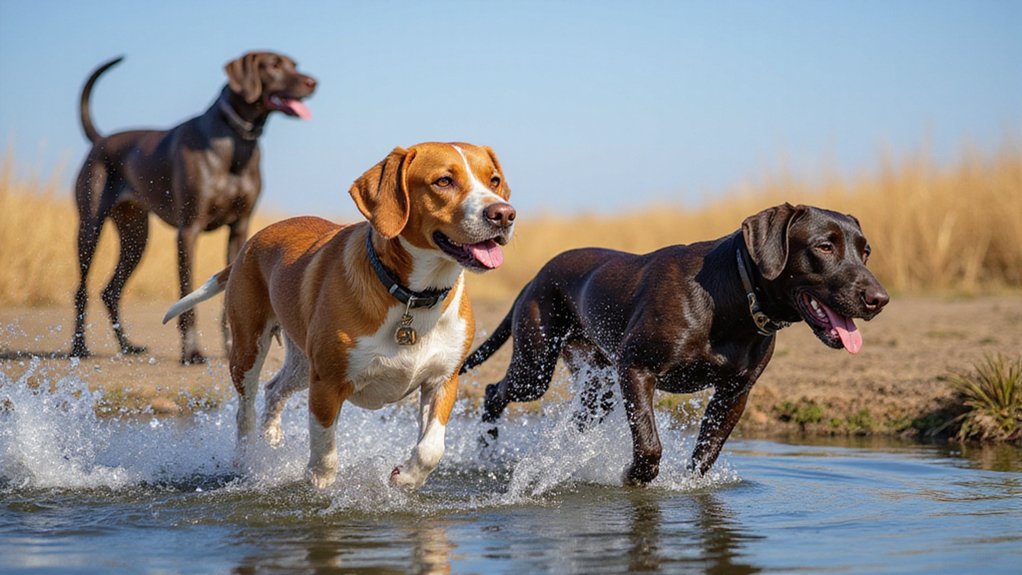When it comes to hunting dogs, knowing the different types can markedly enhance your experience. Each breed has unique skills tailored for specific tasks, whether it’s retrieving, tracking, or flushing game. Understanding these roles is essential for any hunter. So, how do you determine which breed fits your needs? Let’s explore the distinct characteristics that define these dogs and how they contribute to successful hunts.
What are the Different Types of Hunting Dogs?
When it comes to hunting dogs, you’ll find a variety of breeds tailored for specific tasks and terrains.
Retrievers, like Labradors, excel in fetching game from water and land.
Spaniels, such as Cocker Spaniels, are great for flushing birds out of dense cover.
Hounds, including Beagles, are known for their keen sense of smell, tracking scents over long distances.
Pointer breeds, like the English Pointer, excel in locating game by pointing it out.
Finally, terriers, like the Jack Russell, are used for hunting smaller animals, showcasing their tenacity and agility.
Each breed plays a unique role in the hunting experience.
How Do Hunting Dogs Contribute to Big Game Hunting?
Although big game hunting often focuses on the hunter’s skills, hunting dogs play an essential role in enhancing the experience and success of the hunt.
These dogs track scents, locate game, and even help in retrieving animals after the shot. Their keen senses allow you to cover more ground efficiently, increasing your chances of a successful hunt.
Furthermore, they can alert you to danger, keeping you safe in the wilderness. The bond you form with your hunting dog adds a unique dimension to the hunt, making it not just about the kill, but also about companionship and teamwork in the great outdoors.
What Characteristics Define Sporting Dog Breeds?
Hunting dogs come in various breeds, each with unique characteristics that make them suitable for different types of hunting.
Sporting dog breeds, like retrievers and spaniels, are known for their strong instincts and versatility. They possess high energy levels, making them enthusiastic to work in the field.
These dogs are friendly, sociable, and trainable, which helps them form strong bonds with their handlers. Their keen sense of smell and excellent stamina enable them to locate and retrieve game efficiently.
Additionally, sporting dogs often exhibit a playful nature, making them great companions both in and out of the hunting environment.
Why are Hounds Essential in Tracking and Trailing?
Why are hounds so essential for tracking and trailing? These dogs possess unique traits that make them invaluable in the field. Their keen sense of smell allows them to detect scents over great distances, while their tenacity keeps them focused on the task at hand.
Here are a few reasons hounds excel in tracking and trailing:
- Exceptional scent capabilities: They can follow trails that are days old.
- Stamina: Hounds can run for long periods without tiring.
- Intelligence: They quickly learn and adapt to different environments.
- Strong drive: Their passion for the chase keeps them motivated.
- Loyalty: Hounds work tirelessly for their handler.
How to Choose the Right Type of Hunting Dog for Your Needs?
How do you find the perfect hunting dog that suits your style and needs?
First, consider the type of game you hunt. Different breeds excel in various environments—some are better for upland birds, while others thrive in waterfowl settings.
Next, assess your hunting style. Do you prefer a dog that works independently, or one that stays close?
Factor in your living situation and activity level; high-energy breeds need space and exercise.
Finally, research breeds’ temperaments and trainability. It’s essential to choose a dog that not only complements your hunting habits but also fits well within your lifestyle.
What Roles Do Retrievers Play in Waterfowl Hunting?
When you’re out in the marshes or fields pursuing waterfowl, retrievers serve as invaluable partners. They’re not just companions; they enhance your hunting experience considerably.
Here’s what they do:
- Fetch: They retrieve downed birds quickly, saving time.
- Swim: Their strong swimming abilities allow them to navigate through water with ease.
- Locate: They can track and find birds that may land far from where they were shot.
- Mark: Retrievers are skilled at remembering where birds fall, making them efficient.
- Trainability: Their enthusiasm to please means they often follow commands effectively and quickly.
Why are Pointing Breeds Important for Upland Bird Hunting?
Pointing breeds play an essential role in upland bird hunting, much like retrievers do for waterfowl.
These dogs have a natural instinct to locate and indicate the presence of birds by “pointing” with their bodies. This behavior helps you efficiently track game, ensuring you’re aware of their exact location.
Their keen sense of smell and agility allow them to navigate challenging terrains, making it easier for you to flush birds into the open.
With a pointing breed by your side, you can enhance your hunting experience, increase your success rate, and enjoy the thrill of the chase like never before.
How Can Training Enhance the Skills of Your Hunting Dog?
While many hunting dogs have innate abilities, training can greatly enhance their skills and effectiveness in the field. By investing time in training, you can reveal your dog’s full potential.
Here’s how training can help:
- Improves obedience and responsiveness
- Develops specialized skills for different types of game
- Enhances scent tracking and retrieval techniques
- Boosts confidence in various environments
- Fosters a stronger bond between you and your dog
With consistent practice and positive reinforcement, your hunting dog can become a more reliable and efficient partner on your adventures.
Don’t underestimate the power of training—it’s essential for success!
